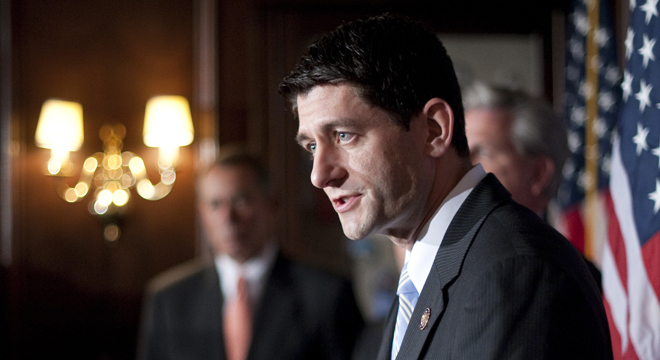On Tuesday afternoon, House Budget Committee Chairman Paul Ryan will unveil an updated version of the GOP’s vision for the country’s future, and the ideological battles that have defined the Obama era will resume with more vigor and more noise than at any time since the 2010 passage of President Obama’s health care law.
That’s not simply because this is an election year, though that’s a huge part of it. The GOP is being driven, for the moment, by a vocal and ideological faction that’s unwilling to retreat from the controversial tax and spending plan they endorsed last year. This year’s Republican budget is expected to include similar plans to roll back popular programs like Medicare and Medicaid, and comes as the Supreme Court is set to hear arguments about the constitutionality of “Obamacare.” Moreover, Republicans will renege on the deal they reached with Democrats during last summer’s debt limit fight, and propose to cut more deeply into other domestic programs that disproportionately benefit the poor.
Add in a contentious presidential election and you have a recipe for an unusually clear-eyed ideological debate over whether New Deal and Great Society-like federal programs are in the country’s best interest, or whether they were errors that ought to be unwound.
This will manifest in scores of smaller fights. But the three biggest of those will mark the coming year: the Republicans’ goal of phasing out traditional Medicare and replacing it with a subsidized private insurance system; their twin goal of repealing the health care law, which creates a similar subsidized private insurance system for uninsured adults; and the nearer-term question of how deeply to cut into other federal programs — and thus of whether there will be a government shutdown less than two months before the November election.
The Medicare fight will by and large be a replay of the Medicare privatization fight that played out last spring. This time around, the GOP is expected to propose a more modest version of the same plan. Medicare would still be phased out for future seniors, and replaced with a subsidized private insurance market. But future seniors could theoretically use those subsidies to buy into traditional Medicare. In proposing to reconfigure the existing system so dramatically, the plan would end the decades-old benefit guarantee that defines the current program.
Because Ryan teamed up on this incarnation of the plan with one heterodox Democrat, Sen. Ron Wyden (D-OR), Republicans will claim to have found a bipartisan solution to Medicare’s explosive cost-growth problem. Democrats laugh this off as the thinnest of fig leafs, and vow to refocus the country’s attention on the GOP’s true intention: the slow unwinding of the federal safety net.
Ryan’s budget is also expected to call for the full repeal of “Obamacare.” Democrats are less comfortable defending the Affordable Care Act than they are defending Medicare. But the law’s two-year anniversary and its day before the Supreme Court have reinvigorated party leaders, who are intent on selling the law’s most popular provisions, some of which have already taken effect: a senior prescription drug rebate that will eventually close the Medicare Part D donut hole; a requirement that insurers allow people 26 and under to be covered under their parents’ health care plans; free annual checkups for seniors; preventive health care benefits for women; and, soon, a nationwide coverage guarantee, banning insurers from refusing to sell coverage to high-risk consumers; and the elimination of the gender disparity in insurance premiums.
Republicans, meanwhile, are increasingly divided over how to push for repeal. These differences over strategy don’t undermine the broad GOP consensus that the whole law should go, but threaten to slow the party’s anti-Obamacare juggernaut, at a time when they’d hoped to make it a major election-year issue.
And then there’s all the other stuff. Last summer, as the GOP-led House marched the country toward defaulting on the national debt, leaders of both parties averted that calamity with an agreement that included statutory limits on discretionary spending — annual funding for federal programs ranging from education to medical research to border security. Those caps weren’t low enough for conservative Republicans who want to cut more deeply into those programs. The GOP budget will lock them into that position — it will call on House appropriators to limit overall federal spending below the agreed-upon level.
That could touch off a September government shutdown fight — an outcome GOP leaders had hoped to avoid. But faced with a rebellion on the right — one that threatened the party’s ability to pass a budget at all — leaders obliged, which means all bets are off on Capitol Hill this fall.










